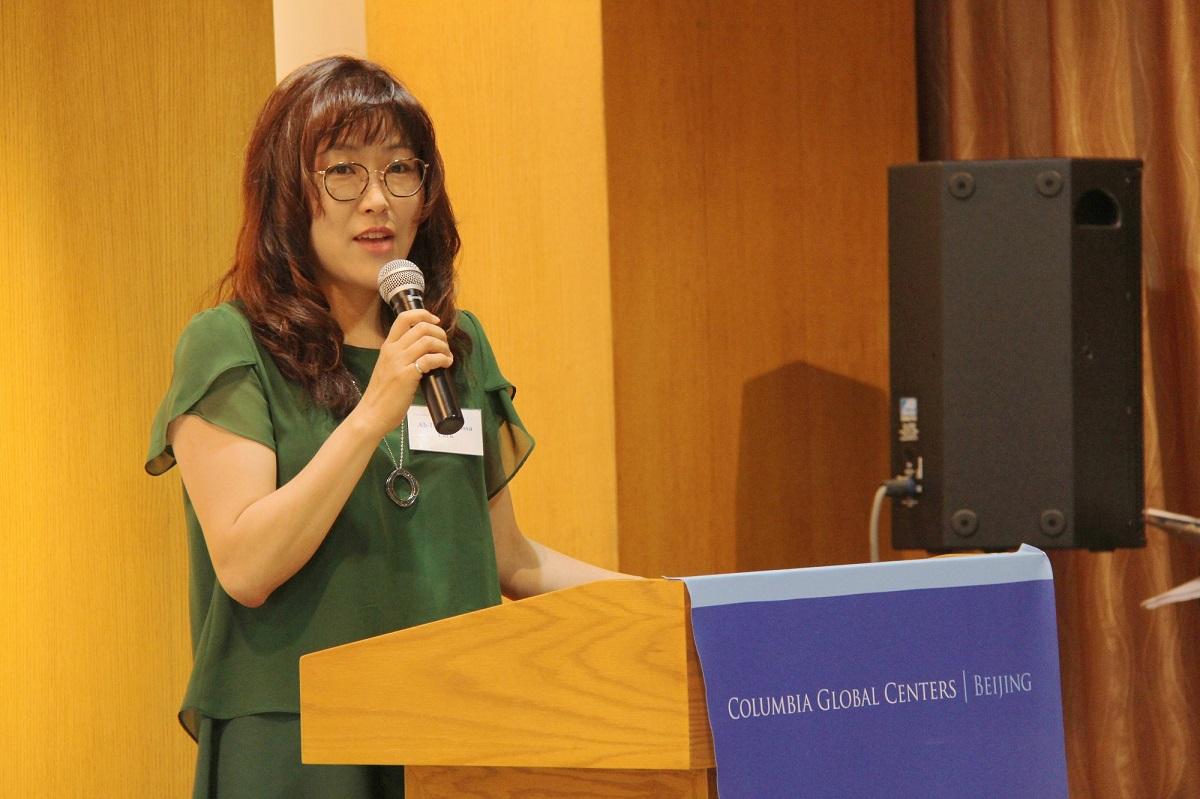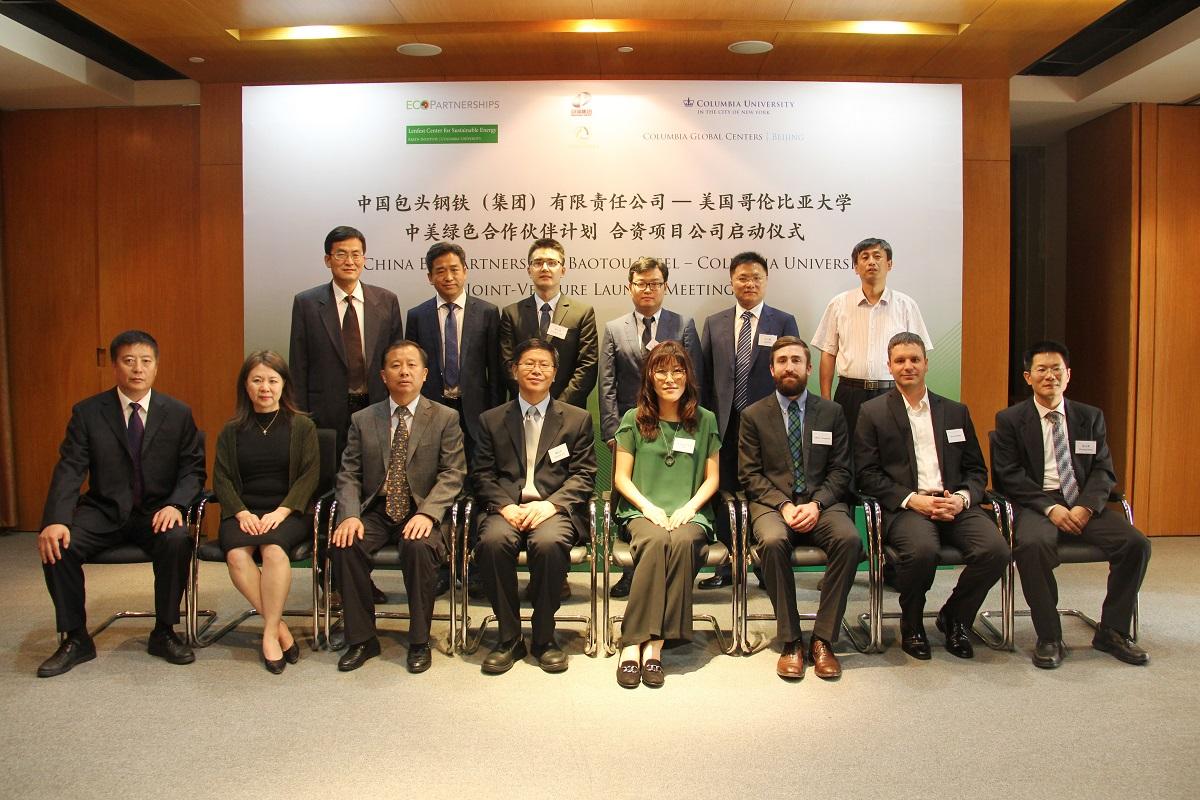Columbia University and China Baotou Steel Launched U.S.-China EcoPartnership Joint-Venture on May 25th, 2017

“The U.S.-China EcoPartnership Opening Ceremony and Press Conference” was successfully held at Columbia Global Centers | Beijing by China Baotou Steel (Group) and Columbia University on Thursday, May 25th, 2017. During the conference, researchers from Columbia University School of Engineering and Applied Science for the first time unveiled their groundbreaking chemical engineering technology and revealed details on Columbia’s incoming installation of a pilot plant at Baotou Steel factory in Inner Mongolia, China.
Other attendees included: WEI Shuanshi, Chairman of the Board at Baotou Steel; Jock Whittlesey, Environment, Science, Technology and Health Counsellor at U.S. Embassy in Beijing; WANG Yuwei from National Development and Reform Commission Department of International Cooperation; and PENG Xin, Chief Finance Officer at Columbia Global Center at Columbia University in the City of New York.
Today most slag – iron and steel-manufacturing waste – ends up in landfills or piled above ground. While slag depresses real estate values, heavy metals in the slag are at risk of causing water and air pollution as well as environment and health problems. A research team led by Professor Alissa Park and Dr. ZHOU Xiaozhou from Columbia University School of Engineering and Applied Science has developed a chemical engineering technology that converts manufacturing wastes into useful and safe materials. These materials could be used in a range of industries, including paper, plastic, paint, cement, oil, and gas. In the meantime, the patented process also holds the potential to reduce greenhouse gas emissions by making use of waste heat and carbon dioxide captured at factory smokestacks.
“Our research focuses on using ores to absorb, capture, and store carbon dioxide,” said Prof. Park, Lenfest Professor in Applied Climate Science at Department of Earth and Environmental Engineering & Department of Chemical Engineering and director of Columbia University Lenfest Center for Sustainable Energy. “We hope our technology will be able to solve two problems: industrial slag piles and carbon dioxide emission.”
As the world’s top producer of iron and steel, China has a slag surplus of its own, accumulating at the rate of 80 million tons per year. That’s on top of the 1.5 billion tons of slag sitting above and belowground. The above treatment process could substantially reduce the solid waste that has built up in countries with a heavy steel and iron-manufacturing presence, including China, while reducing the amount of raw materials needed in manufacturing and construction. It is estimated that each ton of slag yields 1.3 tons of recycled material that can fetch between $150 to $200/ton.
As the project lead and an associate research scientist at Columbia University Lenfest Center for Sustainable Energy, Dr. Zhou indicated that the recycle of the slag would benefit economic, environmental and social development. It could not only relieve the potential risks and protect land resources, but also create higher economic benefits.
As one of the six “U.S.-China EcoPartnership” projects, a pilot project by Columbia research team and Baotou Steel will be launched this summer at Baotou Steel factory in Inner Mongolia, China. The project construction will be completed around spring 2018 and is aimed to research, demo, pilot, and commercialize the technology. A “scale out” will begin as results start coming in and is expected to treat up to 10 percent of Baotou’s on-site slag.
“We are more than honored to cooperate with Columbia University to develop slag recycling technology,” said PAN Ying, the vice general manager of Baotou Steel. “We hope our efforts will benefit the whole steel industry and the society.”
Pan added that Columbia University has a myriad of excellent researches and patents in the fields of mineral smelt, environmental protection, pollution management, carbon emission mitigation, sustainability, and resource development. The partnership between Columbia University and Baotou Steel will accelerate the transformation of China's steel industry and will encourage the development of the U.S-China clean technology.
“We are incredibly proud of the work that Dr. Park and Dr. Zhou have done here at Columbia in the research labs and also incredibly proud of their collaboration with Baotou Steel,” said Orin Herskowitz, the senior vice president at Columbia University Intellectual Property and Technology Transfer and the executive director of Columbia Technology Ventures.
“It’s really only by applying this novel technology and innovation that’s coming out of primarily from the world’s leading research universities, to but not just on their own, they needed to be paired with talented entrepreneurs, venture capitalists who are willing to fund this kind of challenging early stage science, and the world’s leading companies, who can eventually become the consumers and customers for these start-ups, and help those innovations really make a difference in the world, getting embedded in products, that will lead their save or improve lives across the whole world,” Herskowitz added.
If the project is successful, the researchers see a global market for their slag treatment technology—any country that has or has had a major steel and iron-manufacturing base and other alkaline industry waste generation sites.
